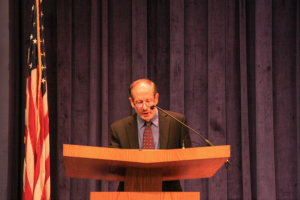Today’s political divisions and partisanship in the United States originate from the fracturing of the moderate political ideology in the 1960s, Sidney M. Milkis, the distinguished teaching professor in the Department of Politics at the University of Virginia, said during an event in the Edward B. Bunn, S.J. Intercultural Center auditorium Oct. 15.
Richard Boyd, the director of the Tocqueville Forum for Political Understanding, moderated the event, titled “What Happened to the Vital Center: The Fracturing of America and the Rise of Donald Trump.” The event’s lecturer, Milkis, authored multiple books about political parties in the United States, including “The Great Society and the High Tide of Liberalism,” and currently teaches American government.

While modern modes of mass communication, such as Twitter, exacerbate the divisions in American politics, divisions originated with the destruction of the center in American politics during the 1960s, Milkis said, referring to what historian and intellectual Arthur Schlesinger Jr. called the tearing apart of the vital center of American politics in 1960s.
“The disruptive 2016 election, and the first two years of the Trump presidency, did not come out of nowhere. In fact, the current circus maximus is the culmination of developments that have been festering for more than five decades,” Milkis said. “The contemporary battles between Republicans and Democrats, liberals and conservatives, represent the legacy of the tearing apart of what Arthur Schlesinger Jr. called the vital center of American politics during the 1960s.”
Liberal movements in the 1960s like the civil rights movements, the women’s rights and the anti-war movements pulled apart the center of American politics by criticizing the New Deal state, which expanded national administrative power through bipartisanship, for encouraging indifference to the injustices occurring around the world, according to Milkis.
“Most critics of partisan rancor blame the republicans for fracturing America, but really it was the leftists, especially the leaders of the civil rights and anti-war movement, who first threw American politics off-center, who rejected the working arrangements of the by-then fatigued new deal state that appeared to insulate American government from public accountability,” Milkis said.
The advocacy movements in the late 1960s gave rise to more militant conservatism of politicians such as Sen. Barry Goldwater (R-Ariz.) causing conservatives to stray further from the center and to reject the moderate republicanism that President Dwight Eisenhower advocated, Milkis said.
“Security from domestic violence, no less than from foreign aggression, Goldwater told to the GOP delegates, is the most elementary and fundamental purpose of any government,” Milkis said. “A government that cannot fulfill that purpose is a government that cannot long command the loyalty of its citizens. So Goldwater preached the gospel of law and order that would become a rallying cry for the new right.”
The 2016 presidential election exacerbated partisan divisions, Milkis said. Trump followed in Goldwater’s and President Richard Nixon’s footsteps, presenting himself as the law and order candidate and contributing to the Republican parties’ shift right. Republican politicians’ claim that they will establish security and order, which reflects how the Democrats and the Republicans have moved away from debating the role of a large national government and toward defending one of Franklin D. Roosevelt’s four freedoms: freedom of speech, freedom of religion, freedom from fear, and freedom from want, according to Milkis.
“Put simply, the liberals are devoted to the welfare state, they embrace freedom from want, and conservatives embellish the national security state,” Milkis said. “Conservatives embrace freedom from fear. And the politics of fear is at the heart of Trumpism. All this suggests that Trump is a symptom, not a cause, of America’s discontent.”
While Trump pulled the Republican party more to the right, other politicians such as Sen. Bernie Sanders (I-Vt.) also pulled the Democratic party further from the center, according to Milkis.
“Even though his revolution fell short, Bernie’s remarkable campaign made its impact on the election,” Milkis said. “Hillary Clinton and the Democrats were pushed far more to the left than they would have been in the absence of the Sanders’ campaign on education, on trade, on healthcare policy.”




















